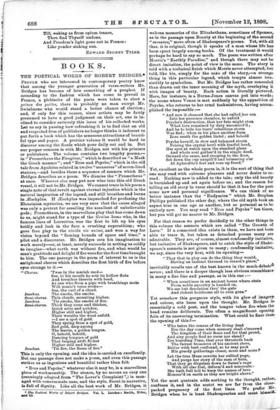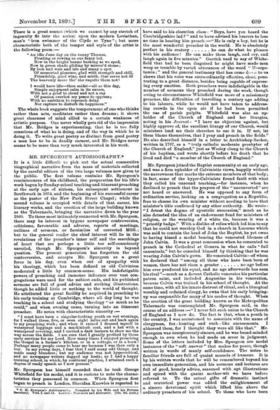BOOKS.
THE POETICAL WORKS OF ROBERT BRIDGES.*
PEOPLE who are interested in contemporary poetry know that among the younger generation of verse-writers Mr. Bridges has become of late something of a prophet. If according to the fashion which has come to prevail in France, a plebiscite of the poets were taken to elect a prince des poetes, there is probably no man except Mr.
Swinburne who would stand a better chance of election ; and, if only for this reason, since artists may be fairly presumed to have a good judgment on their art, one is in- clined to consider seriously this issue of his collected works.
Let us say in passing how refreshing it is to find that an old and respected firm of publishers no longer thinks it indecent to put forth a book which has the sensuous attractions of beauti- ful type and paper. A prettier volume it would be hard to discover among the floods which pour daily out and in. But our proper concern is with Mr. Bridges, not with his printers or publishers. The volume contains two lengthy poems,— in " Prometheus the Firegiver," which is described as "a Mask the Greek manner "; and " Eros and Psyche," which is the old tale from Apuleitis related in twelve " measures" of seven-lined stanzas,—and besides these a sequence of sonnets which Mr. Bridges describes as a poem. We dismiss the "Prometheus" at once. Whoever else may put new wine into this old Greek vessel, it will not be Mr. Bridges. We cannot trace in his poem a single note of that revolt against eternal injustice which is the
natural inspiration of the legend, and still breathes and burns in 2Eschylus. If .ZEschylus was impeached for profaning the Eleusinian mysteries, we are very sure that the cause alleged was only a pretext for assailing the assailant of unbelievable gods ; Prometheus, in the marvellous play that has come down to us, might stand for a type of the Graius homo who, in the famous lines of Lucretius, was the first to lift up his eyes boldly and look in the face a crushing superstition; who gave free play to the vivida vis animi, and won a way for
vision beyond the "flaming bounds of space and time," a pilot and a discoverer. Mr. Bridges sets his imagination to work merely—or, at least, merely succeeds in setting us coldly to imagine—what earth was without fire, and what would be man's gratitude and delight if fire werefor the first timebrought to him. The one passage in the poem of interest to us is the antiphonal chorus which describes the first birth of fire before eyes strange to it :—
" Chorus. 'Twas in the marish reed—
See, to his mouth he sets its hollow flute And breathes therein with heed,
As one who from a pipe with breathings mute Will music's voice evoke— See, the curl of a cloud.
Inachus. The smoke, the smoke.
Bemi-clu:prus. Thin clouds, mounting higher.
Inachus. 'Tis smoke, the smoke of fire. Bemi-chortts. Thick they come and thicker,
Quick arise and quicker, Higher still and higher, Their wreaths the wood enfold.
—I see a spot of gold.
They spring from a spot of gold, Red gold, deep among
The leaves, a golden tongue.
0, behold, behold, Dancing tongues of gold
That leaping aloft flicker
Higher still and higher.
Inachus. 'Till fire, the flame of fire."
This is only the opening, and the idea is carried on excellently.
But one passage does not make a poem, and even this passage strikes us as ingenious and beautiful rather than felt.
"Eros and Psyche," whatever else it may be, is a marvellous piece of workmanship. The stanza, by no means an easy one (cunningly adapted from "The Lover's Complaint ",) is man- aged with consummate ease, and the style, fluent in narrative, is full of dignity. Like all the best work of Mr. Bridges, it
• The Poetical Works of Robert Bridges. Vol. I. Landon' Smith, Elder, aad Co
wakens memories of the Elizabethans, sometimes of Spensey, as in the passage upon Beauty at the beginning of the second "measure," more often of Shakespeare's poems. Yet, with al) that, it is original, though it speaks of a man whose life has.
been spent largely among books. Of the treatment it would perhaps be hard to say so much. The poem was written after Morris's "Earthly Paradise," and though there may not be direct imitation, the point of view is the same. The story is- told with a technical finish which Morris never attempted, but told, like his, simply for the sake of the story,—a strange thing in this particular legend, which tempts almost irre..
sistibly to symbolism. But Mr. Bridges has rather concealed than drawn out the inner meaning of the myth, overlaying it with images of beauty. Each action is literally picture& Here, for instance, is a Burne-Jones canvas put into words; the scene where Venus is met suddenly by the apparition of Psyche, who returns to her cruel taskmistress, having accom- plished the impossible :—
"And now it chanced that she had called her son
Into her presence chamber, to unfold Psyche's destruction, that her fate might stun What love remained by duty nncontrord ; And he to hide his tears' rebellious storm Was fled ; when in his place another form Rose neath the golden lintel ; and behold Psyche herself, in slow and balanced strain Poising the crystal bowl with fearful heed, Her eyes at watch upon the steadied plane And whole soul gather'd in the single deed. Onward she came, and stooping to the floor, Set down the cup unspill'd and brimming o'er
At Aphrodite's feet and rose up freed."
Yet, excellent as the whole poem is, it is the sort of thing that one may read with extreme pleasure and never desire to re-- read. Nothing new is added to the tale; only the old beauty is burnished up and set again before us ; and the reason for telling an old story in verse should be that it has for the poet. some new and personal significance. We can think of no better instance than the " Endymion " which Mr. Stephen Phillips published the other day, where the old myth took an.
aspect true in one age as another, but so personal as to bo entirely new. You may read "Eros and Psyche" ten times, but you will get no nearer to Mr. Bridges.
For that reason we prefer decidedly to the other things in this volume the sonnets which are called "The Growth of Love." If a connected idea exists in them, we have not been,
able to trace it, but taken as detached poems many are admirable. They are, of course, almost confessedly imitative„ but imitative of Shakespeare, and to catch the style of Shake- speare's sonnets is not given to many ; confessedly imitative,. we say, since the very first, with its opening-
" They that in play can do the thing they would, Having an instinct throned in reason's place,"
inevitably recalls one of the best known in the much-debate series ; and there is a deeper though less obvious resemblano in many a fine line and passage, as in this one :—
" When soinetimes in an ancient house where state
From noble ancestry is handed on, We see but desolation thro' the gate And richest heirlooms all to ruin gone."
Yet somehow this gorgeous style, with its glow of imager" and colour, sits loose upon the thought. Mr. Bridges is.
essentially a cold poet, and the tongue takes fire when the bead remains deliberate. Too often a magnificent opening fails of its answering termination. What could be finer than/ the opening of this ?— " Who takes the census of the living dead
Ere the day come when memory shall o'ercrowd The kingdom of their fame and for that proud, And airy people find no room nor stead ?
Ere hoarding Time, that ever thrusteth back The fairest treasures of his ancient store, Better with best confound, so he may pack His greedy gatherings closer, more and more ?'
Let the true Muse rewrite her sullied page, And purge her story of the men of hate, That they go dirgeless down to Satan's rage
With all else foul, deform'd and miscreate : She bath full toil to keep the names of love Honour'd on earth as they are bright above."
Yet the next quatrain adds nothing to the thought, rather,. confuses it, and in the sestet we are far from the close- packed pregnancy of the first lines. We prefer Mn. Bridges when he is least Shakespearian and roost himsa. There is a great sonnet (which we cannot by any stretch of ingenuity fit into the series) upon the modern Leviathan, man's "iron swimmer of the Clyde or Tyne " ; but more characteristic both of the temper and style of the artist is the following poem :—
"An idle June day on the sunny Thames,
Floating or rowing as our fancy led, Now in the bright beams basking as we sped, Now in green shade gliding by mirror'd stems ;
By lock and weir and isle and many a spot
Of memoried pleasure, glad with strength and skill, Friendship, good wine, and mirth, that serve not ill The heavenly muse tho' she requite them not!
I would have life—thou saidst—all as this day,
Simple enjoyment calm in its excess, With not a grief to cloud and not a ray Of passion overhot my peace to oppress ; With no ambition to reproach delay Nor rapture to disturb its happiness."
The whole book suggests the temperament of one who thinks rather than acts, meditates rather than dreams ; it shows great clearness of mind allied to a certain weakness of artistic purpose. One never wholly gets rid of the impression that Mr. Bridges is experimenting, that he is too frilly conscious of what he is doing, and of the way in which he is doing it. To write great poetry as distinct from good poetry a man has to be in deadly earnest, and Mr. Bridges never seems to be more than very much interested in his work.







































 Previous page
Previous page